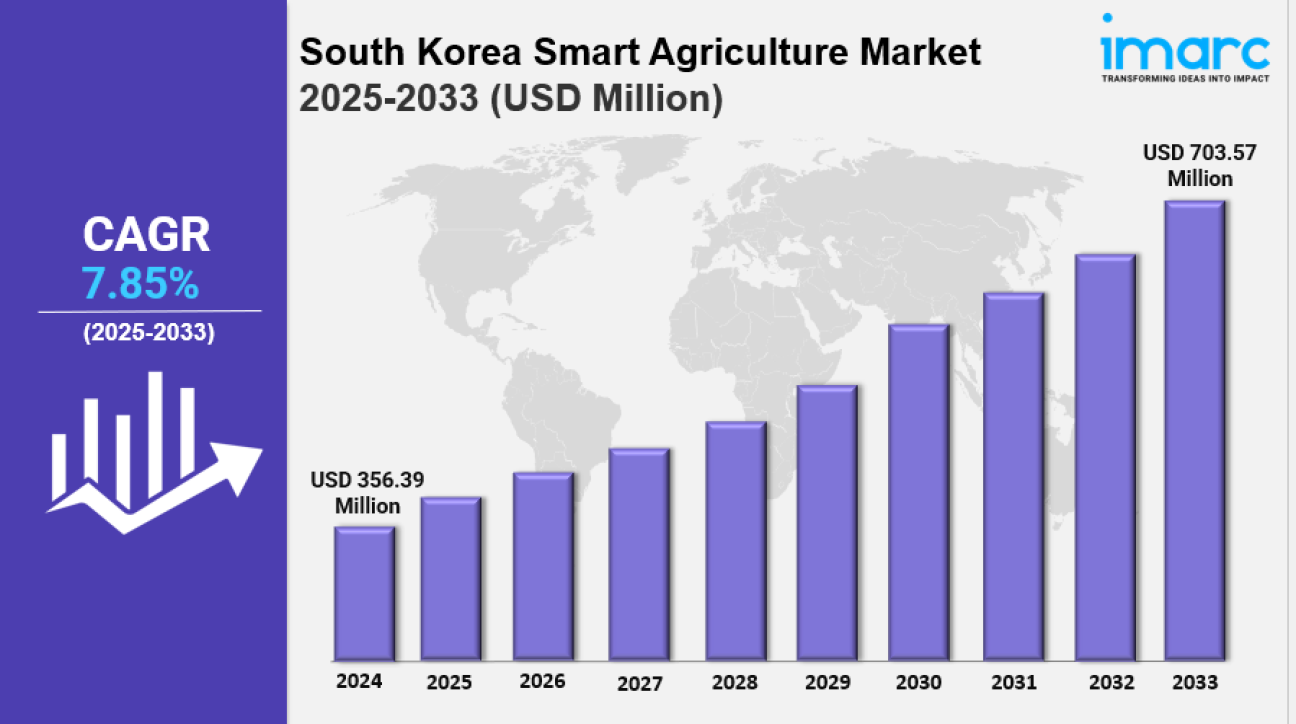South Korea Smart Agriculture Market Size, Growth, Key Players, Latest Trends and Forecast 2025-2033

IMARC Group has recently released a new research study titled “South Korea Smart Agriculture Market Size, Share, Trends and Forecast by Agriculture Type, Offering, Farm Size, and Region, 2025-2033”, offers a detailed analysis of the market drivers, segmentation, growth opportunities, trends and competitive landscape to understand the current and future market scenarios.
South Korea Smart Agriculture Market Overview
The South Korea Smart Agriculture Market size reached USD 356.39 Million in 2024 and is projected to grow to USD 703.57 Million by 2033. This expansion corresponds to a CAGR of 7.85% over the forecast period 2025-2033. The market growth is propelled by technological adoption including IoT, AI, and automation to enhance productivity and resource efficiency, supported by government initiatives and addressing labor shortages.
Study Assumption Years
- Base Year: 2024
- Historical Year/Period: 2019-2024
- Forecast Year/Period: 2025-2033
South Korea Smart Agriculture Market Key Takeaways
- Current Market Size: USD 356.39 Million (2024)
- CAGR: 7.85%
- Forecast Period: 2025-2033
- Government initiatives, such as the Smart Farm Innovation Valley, play a critical role by providing training, pilot technology, and financial support.
- Aging rural workforce and labor shortages accelerate the demand for automation and digital farming technologies.
- South Korea’s advanced ICT infrastructure supports adoption of smart farming solutions like IoT sensors, drones, and AI-powered machinery.
- Major technology companies such as SK Telecom, KT, and Samsung are actively driving innovation in the agri-tech sector.
Sample Request Link: https://www.imarcgroup.com/south-korea-smart-agriculture-market/requestsample
Market Growth Factors
Robust Government Initiatives and Policy Backing
The South Korean government is instrumental in pushing smart agriculture forward via strategic plans, subsidies, and infrastructure projects. Key initiatives like the Smart Farm Innovation Valley deliver research and pilot technologies, training farmers nationwide. Ministries including the Ministry of Agriculture, Food and Rural Affairs (MAFRA) and the Ministry of Science and ICT emphasize integrating digital innovations such as IoT, AI, and big data. Financial incentives including grants and low-interest loans for smart equipment encourage both smallholders and large farms. Such policies not only promote productivity and sustainability but also foster an ecosystem for startups and technological advancement, serving as a major market growth driver.
Aging Rural Workforce and Labor Shortages
South Korea faces a pressing issue with a significant portion of its farming population over 65, alongside low interest from younger generations in traditional agriculture. This demographic challenge drives demand for automation and digital solutions to maintain productivity. Technologies like automated irrigation, sensor-driven crop monitoring, drones, and AI-powered machinery reduce the dependency on manual labor, making farming less labor-intensive and more attractive to younger, tech-savvy entrepreneurs. The government supports this transition with education and relocation incentives to replenish the workforce, making labor shortages a core factor accelerating smart agriculture adoption.
Advanced Technology and Digital Infrastructure
South Korea leverages its strong ICT, AI capabilities, and high-speed connectivity to rapidly implement smart farming technologies. Its widespread digital infrastructure facilitates real-time data capture through IoT sensors, satellite imaging, and precision monitoring. AI algorithms assist in weather forecasting, irrigation management, early disease detection, and yield enhancement. The use of drones and automated machinery is increasing in both open field and vertical farms. Leading technology firms such as SK Telecom, KT, and Samsung are contributing significantly to innovation and commercialization, supported by government research and integrated data platforms. This digital strength is a crucial engine driving the transformation to high-tech, data-driven agriculture.
Market Segmentation
Agriculture Type:
- Precision Farming: Uses technology to monitor and optimize crop production precisely, improving yields and resource use.
- Livestock Monitoring: Implements digital tools to track animal health and productivity, enhancing farm management.
- Smart Greenhouse: Employs controlled environment agriculture integrated with smart technologies for optimized plant growth.
- Others: Covers additional smart agriculture applications not included in the above categories.
Offering:
- Hardware: Physical devices such as sensors, drones, and automated machinery used in smart farming.
- Software: Programs and applications for data analysis, farm management, and operation automation.
- Service: Support and consultancy services including installation, monitoring, and maintenance of smart agriculture solutions.
Farm Size:
- Small: Farms of limited acreage using smart technologies tailored for small-scale production.
- Medium: Farms with moderate land size adopting a mix of traditional and smart agriculture methods.
- Large: Large-scale farms extensively deploying smart agriculture infrastructure and technologies.
Regional Insights
The report covers major regions including Seoul Capital Area, Yeongnam (Southeastern Region), Honam (Southwestern Region), Hoseo (Central Region), and others. The source does not specify the dominant region or exact market shares or CAGR for these regions.
Summary: Not provided in source.
Recent Developments & News
In April 2025, South Korea and Saudi Arabia formed a partnership to establish a cutting-edge smart farming complex in central Riyadh. This collaboration aims to advance sustainable agriculture and technological progress in the Middle East, addressing climate challenges and food security. This venture is a pivotal step in evolving agriculture practices beyond South Korea.
Key Players
- SK Telecom
- KT
- Samsung
About Us
IMARC Group is a global management consulting firm that helps the world’s most ambitious changemakers to create a lasting impact. The company provide a comprehensive suite of market entry and expansion services. IMARC offerings include thorough market assessment, feasibility studies, company incorporation assistance, factory setup support, regulatory approvals and licensing navigation, branding, marketing and sales strategies, competitive landscape and benchmarking analyses, pricing and cost research, and procurement research.
Contact Us
IMARC Group,
134 N 4th St. Brooklyn, NY 11249, USA,
Email: sales@imarcgroup.com,
Tel No: (D) +91 120 433 0800,
United States: +1-201971-6302
- Art
- Causes
- Crafts
- Dance
- Drinks
- Film
- Fitness
- Food
- Games
- Gardening
- Health
- Home
- Literature
- Music
- Networking
- Other
- Party
- Religion
- Shopping
- Sports
- Theater
- Wellness


